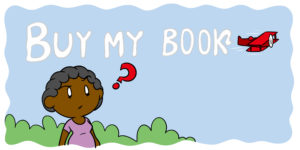Last weekend, my wife and I wandered around a food fair for a while. We looked at all the delicious meals that were on offer, trying to decide what to eat.
One very clever stall was offering free samples of chocolate brownies. We went past once, and were very pleased to be given little taster chunks of food. We found an excuse to wander past again, and helped ourselves to another sample.
Finally, we caved in and bought our own tasty brownies.
A good author blog works in a similar way – writers give their readers a small, delicious free sample of their work in order to entice them to buy the book. As a full novel takes a long time to write, blogs also help to tide fans over until the release of the next work.
Starting a blog is easy – platforms like WordPress, Blogger and Tumblr mean you can have your blog set up for free in a matter of minutes (Click here for a 50% discount on WordPress hosting with Bluehost) – but sometimes authors can struggle to find the right voice for their blog, or aren’t sure what to write about.
For those who are unsure, or for seasoned bloggers who’d like to try something different, here are three ideas for posts that will make any blog an enjoyable reading experience, and will encourage readers to buy your book.
#1: Your personal life
Don’t worry – I’m not talking about explicitly personal secrets, or anything you feel uncomfortable sharing. It’s up to every writer to draw their own line as to what they feel is appropriate to share.
There’s a lot of abstract elements of your life that can be shared without needing to give too much away. Author and actor Wil Weaton, for example, recently blogged about strange dreams that he’d been having in the night.
If you’re inclined to share a little more, perhaps author Stephanie Klein’s blog, full of stories about the school run and other joys of parenting, are a good example of what you can write about.
The benefit of writing about your life is it gives your readers an opportunity to meet you, to know what’s going on in your life, and to become invested in your story. Think of personal stories as the little chunks of chocolate in the free sample brownie of your blog.
Human stories are very compelling, which is why personal blogs are so popular. In reality, it doesn’t matter how much or how little you’re willing to share – your main goal here is to show off your writing skills so that readers will be interested in your books.
#2: World-building
For the sake of this article, I’m going to define ‘world-building’ as any supplementary literature that adds additional insight to your novels. This could be deleted scenes, backstories for minor characters, or hints at what you were thinking when you put the story together.
A fantastic example can be found in the blog of John Finnemore, a writer for the BBC. In a series of blog posts, he went through every episode of his popular radio sitcom Cabin Pressure, taking the time to explain his thought process while writing, giving insight into characters, and providing some deleted material from the episode.
Sharing tidbits from your storytelling has two benefits for your blog: firstly, it gives existing readers a reason to stick around, and secondly, it gives new readers a few free samples of your world, that will draw in their interest and help persuade them to buy your novel.
#3: Inspiration
Your blog will benefit greatly from a few posts talking about your writing process – what books inspire you, how you go about crafting your stories, and what you do when you get stuck.
Television producer and author Lee Goldberg, for example, uses his blog to talk about some of the people and stories that have inspired him. Another blog post from Wil Weaton gives a humorous look at the internal struggles he faces while trying to write.
Fellow storytellers will relish the chance to read your personal thoughts on the creative process, and even those who don’t write their own stories will be eager to see what you have to say. A good blog that gives insight into writing is worth its weight in gold, so opening up about your experience will be a great help to growing your readership.
Don’t forget the links
As a final point, be certain to remember that the purpose of an author blog is to convince people to buy your novel. All of the blogs mentioned above are full of links to where readers can buy the latest books from those authors – from television scripts to dog handbooks to audiobooks, all of these blogging authors make sure that readers know where to go if they want more.
Don’t overdo this, of course, but don’t assume that a single link from six months ago is going to be enough. Even if it’s only a passing reference, be sure to mention your book every few posts, and make sure it’s easy for readers to find where to buy it.
Writing regularly about these topics will mean that when readers new and old stumble across your blog, they’ll want to keep reading. And the more times they visit your stall, the more likely they are to cave in and buy your brownie.
If you need more inspiration then click here for a set of 17 blog post templates crafted specifically for authors.
There are plenty of other topics to write on that’ll draw in crowds, though – perhaps while reading this article you’ve thought of some yourself. If so, leave a comment below so that your fellow authors have some more ideas of what to write about on their blogs!






9 thoughts on “3 Things You Should Be Writing About On Your Author Blog”
Great post, very informative. My most read post on my blog is about pop up cakes (cakes people jump out of at parties, celebrations etc…). One such cake features prominently in a short crime novel I have coming out soon, How Kirsty Gets Her Kicks. It was so much fun to research, so I wanted to show that:)
Hi Jenny,
That’s a great example, and I’ve looked at your blog – you’ve done a great job of making compelling, interesting articles. I feel for your struggles with John Hunt publishing!
Thank you for the tips. My problem is that I published two novels, a health book and a business book simultaneously. Should I have a fiction blog and a non fiction blog? Can I have just one blog? Confused, I haven’t started a blog, but realise I need to. Any ideas welcome!
Hi Issia,
This is a difficult question and I really do wish that there was a clear cut answer to it. On the one hand you want your readership to develop an interest in both your books, but on the other hand, you don’t want to alienate either readership with inappropriate content.
Personally, I run two blogs simultaneously on two different subjects. One is very popular, while the other has a very small but incredibly loyal readership. While it’s frustrating when one blog is read by so many more people than the other, I’ve decided against merging my blogs so as to maintain the camaraderie of the smaller group. I don’t know if my solution is the best for all cases, as there are downsides to both approaches.
I think the best thing you can do is experiment and see what happens. Start a blog, start writing regularly, and see what kind of readers you attract – if nothing else, it’s excellent writing practice!
Let me know if you have any more questions, I’m happy to do my best to answer them.
Wow, thanks for sharing this informative blog with us,
I am a young poet and writer,
really saying I need this blog to know more about blog writing and writing skills
thnks a alot
Informative and inspiring post Matthew. Step #2 struck me like cupid’s arrow. The light bulb shined so bright that I shouted out loud how grateful I am to receive this information at this time in my life. Deleted scenes (we call them outtakes in radio production) are worth their weight in gold. I never thought about using them in a blog. I thought about writing another book centered around the outtakes but now I can give readers a taste of what’s to come in the new book. Eureka! Thanks so much for the tips Matthew!
Great article! I feel so full of ideas after reading it. I’m a new author and do not have a book yet. Is it appropriate to begin a blog about the process of writing it or should I wait until the book is finished?
Hey Matthew, Thanks for such great tips. I found it very useful.
Great advice for those of us who often get stuck 🙂